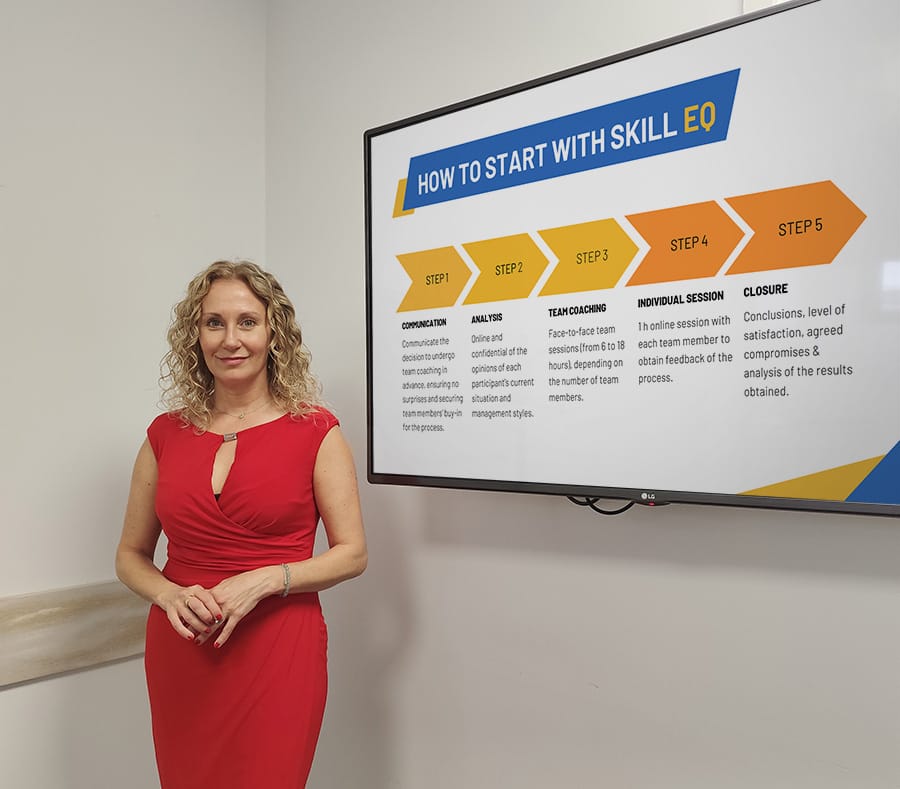ENTRENAMIENTO DE EQUIPOS CON METODOLOGÍA SKILL-EQ

Hablar de gestión y liderazgo del talento responsable, sostenible y eficaz puede ser todo un desafío ya que cada uno de los individuos de un equipo es diferente y en ocasiones actúa o se expresa de forma inesperada ante una misma situación.
Son muchos los factores que juegan a favor de los malos o insuficientes resultados de una organización o de un equipo:
- Personalidad y antecedentes de las personas
- Falta de protocolos o procedimientos
- Exceso de protocolos o procedimientos
- Falta de alineación con los valores corporativos
- Diferentes generaciones que no se entienden
- Malentendido de la estrategia
- Falta de propósito
- La cultura de cada persona
- La cultura de la empresa
- Las subculturas de cada equipo
- El ego excesivo de los jefes, por nombrar algunos.
Sin embargo, en mi carrera profesional, desde los 27 años, he tenido la oportunidad de liderar equipos multigeneracionales y multiculturales, tanto en grandes empresas como en pymes, y todo lo anterior, con todo respeto, son nada más que excusas y sobre todo consecuencias de un mal estilo de liderazgo.
Antes de 2017, cuando fundé Aprofitalents, trabajé para otras empresas y tuve directivos que fueron mis mentores, de los que aprendí mucho, que me respetaron, escucharon, apoyaron, entendieron y me ayudaron a mejorar continuamente. Me alentaron a ser un líder respetuoso y responsable, más allá de mi título; confiaron en mí, delegaron y aumentaron mis responsabilidades y me dejaron errar de forma mesurada. Siempre podría contar con ellos.
También he tenido Directores y Gerentes déspotas, inseguros, con poca empatía y sin humildad, solo sabían sembrar confusión, no sabían liderar, inspirar, ofrecer confianza ni compasión, creaban ambientes tan tóxicos. que generaron malas relaciones internas, bajas psicológicas. Y por supuesto, eran los responsables de la desvinculación del talento joven y de aquellos que llevaban menos tiempo en la empresa.
En este último caso, se trataba de gerentes que iban desde propiedad de la empresa, familiares de la propiedad (descendientes o cónyuges) de todo tipo de género, edad, educación y procedencia, hasta gerentes que habían sido ascendidos sin ningún tipo de coaching ni capacitación. y que no habían tenido un modelo a seguir, ni un mentor en su carrera profesional.
Su falta de valores y principios, que son los que dictan nuestro comportamiento, los convirtieron en tsunamis emocionales, destruyendo el optimismo, las relaciones internas sanas y la comunicación necesaria.
Estas personas son enemigas de la fidelización del talento, del aumento de los beneficios y de la competitividad necesaria para que una empresa perdure en el tiempo y tenga una buena reputación en el mercado.
El principal problema que encontramos en las empresas que están impulsando una transformación digital es que jefes y directores se centran principalmente en la tecnología, que, en definitiva, es el proceso de organizar el trabajo para que las personas y la tecnología trabajen mejor. juntos.
De hecho, el establecimiento de nuevas tecnologías les ayudará a analizar, tomar mejores y más rápidas decisiones y obtener importantes resultados económicos.
Pero, ¿sabías que según el Dr. y psicólogo Daniel Goleman, el éxito, tanto personal como organizacional, se debe en un 80% a la inteligencia emocional o EQ, y sólo en un 20% al IQ o habilidades técnicas?
Los gerentes deben aceptar y comprender tres cuestiones básicas relacionadas con el liderazgo y los resultados del equipo:
- Su principal responsabilidad es el liderazgo de las personas y las relaciones que generan en la empresa.
- Sus personas son las que impulsan el cambio y las que se ven afectadas por él.
- Su propio éxito es el resultado del trabajo en equipo, no al revés.
Dado que la inteligencia emocional no ha sido un conocimiento académico hasta los últimos años, la mayoría de personas que ocuparon puestos de alta dirección carecen de ella, la desconocen o tienen que desarrollarla.
En 2017, después de ver que el coaching ejecutivo tardaba meses en conseguir que algunos líderes de equipo consiguieran por sí solos cambios considerables, con la frustración que esto podía generar, creé una metodología llamada SKILL-EQ.
Es en sesiones de coaching junto a su equipo y de forma presencial, que abordan y resuelven los problemas que enfrentan estos directivos cuando intentan alinear sus equipos, involucrar a su gente en la adopción de planes de cambio y transformación digital, ya que solo tres sesiones grupales de unas 3 o 4 horas cada uno.
Después de años de investigación y mi propia experiencia en gestión, comprobé que en la mayoría de los casos (si no el 100%), los problemas que tenían los equipos, por los cuales no lograban los resultados esperados en sus objetivos o KPIs, se originaban por la falta de confianza que transmiten los directivos y de sus escasas habilidades comunicativas y relacionales.
Durante las sesiones presenciales aprenden, comprenden y desarrollan su propia inteligencia emocional como trampolín para mejorar la comunicación interna, la confianza y las relaciones de equipo. El resto de personas también aprenden a desarrollar su liderazgo individual y entienden que son corresponsables de los resultados de su equipo/empresa.
¿Cómo empezar con la metodología SKILL EQ y qué implica?
Es importante mentalizar al equipo antes de comenzar con la metodología, su implicación es clave para el éxito del proceso, lo que requerirá flexibilidad, paciencia, humildad, confianza, así como un cambio de mentalidad de todos los miembros del equipo.
El proceso SKILL-EQ:
Tras un análisis online y confidencial de la opinión de todos sobre la situación actual, los estilos y personalidades de cada participante, el proceso consta de tres partes:
- Sesiones de coaching grupal de 9 a 16 horas, dependiendo del número de integrantes del equipo.
- Sesiones individuales de 1 hora con cada participante después de la metodología.
- Consenso y comunicación de los compromisos adquiridos por el equipo (que hacen que los resultados sean sostenibles en el tiempo).
¿Quién puede beneficiarse de SKILL-EQ?
- Equipos que necesitan alinearse o mejorar sus relaciones internas y comunicación.
- Equipos que necesitan mejorar su desempeño para alcanzar los resultados económicos marcados por la empresa.
- Empresas con grupos de personas que trabajan en silos.
- Empresas en proceso de cambio de dirección o de fusión.
¿Quién participa?
- Gerentes Generales, Directores Generales y sus Jefes o Directores
- Gerentes o jefes de equipo con su personal directo.
Para obtener más información sobre la Metodología SKILL-EQ haga clic en este para ver todos nuestros servicios Enlace
Post escrito por Susana Jiménez, Fundadora, Ejecutiva y LinkTeam coach, creadora de la Metodología SKILL-EQ.
Susana Jiménez es la fundadora de Aprofitalents, una consultoría de RRHH dedicada a impulsar un liderazgo responsable y saludable. Con más de dos décadas de experiencia internacional en dirección de equipos y empresas, Susana es también Coach Ejecutiva y de Equipos, y la creadora de la metodología SKILL-EQ. Su misión es fomentar equipos innovadores, productivos y autogestionados.



